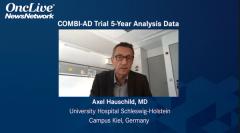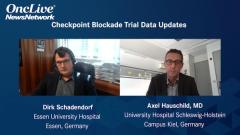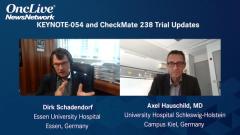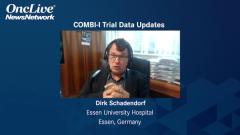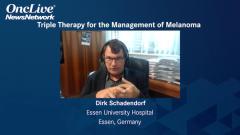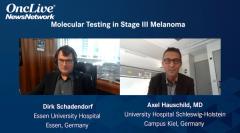
COMBI-AD Trial 5-Year Analysis Data
Episodes in this series

Axel Hauschild, MD: I would suggest to switch to the adjuvant treatments, and there were some releases at ASCO [American Society of Clinical Oncology Annual Meeting] and ESMO [European Society of Medical Oncology Congress].
Dirk Schadendorf, MD: Axel, you have been a key author on some of these presentations at ASCO and ESMO and also leading some of the publications on, for example, the COMBI-AD study. For COMBI-AD, maybe you can explain briefly this study design and what we have learned over the last 5 years?
Axel Hauschild, MD: Yes. It’s for BRAF mutations, a combo of dabrafenib and trametinib, so BRAF and a MEK inhibitor. It was a randomized clinical trial on 870 patients. The randomization was 1:1 toward the combo or matching placebos. The results, in the first place, were very exciting, and everybody was expecting that over the long run the results might be less exciting. The big surprise is that we have 5-year follow-up time now, and still the 5-year data are in the same range regarding the hazard ratios and the relapse-free survival as the 2, 3, and 4-year analyses, and that I guess was a big surprise.
Dirk Schadendorf, MD: That’s a very important point, the longevity of the responses we are seeing and, as you mentioned, it’s exemplified by the hazard ratio. In the past we have speculated so much about cross between targeted therapy and checkpoint blockade. That’s what we will revisit in a minute, but before we come to comparison, or indirect comparison, of statements about checkpoint blockade in stage III disease, I want to home in on some details and subgroups of the COMBI-AD data set that are also of relevance for the clinical practice, which is the staging. There is stage IIIA, IIIB, and IIIC, and according to the AJCC [American Joint Committee on Cancer] seventh edition, we also have IIID. Is it of any relevance whether the patient is stage IIIA, IIIB, IIIC, or IIID in terms of offering adjuvant treatment? What is your take on that?
Axel Hauschild, MD: In the German guidelines we are saying that we need to offer the adjuvant treatment for all comers of stage III. The clinical trials, COMBI-AD and the trial on pembrolizumab, the KEYNOTE study, were done in patients with more than 1-mm tumor thickness in the cellular node, which means the cellular node micrometastases need to have a certain diameter. It is approved for all comers, but we need to discuss it. There is no question about value of dabrafenib-trametinib for stage IIIB, IIIC, and IIID. The hazard ratios are all the same, and in the old justification, it was also in the range of 0.50, so 50% improvement of relapse-free survival, and there is improvement of distant metastases-free survival, and there is improvement of overall survival. All this has been shown. The only debate that is still ongoing, and it will on go for the next years—I can predict it—is stage IIIA, because the risk to relapse is in general much lower, particularly in the eighth edition of the American Joint Committee on Cancer staging system. That is the only question, because there’s a low number of events.
Dirk Schadendorf, MD: That’s true, but if we assume it will be the same hazard ratio and that roughly 50% of the patients we can protect from tumor progression, isn’t that the same argument you would take for those patients as well?
Axel Hauschild, MD: I agree, and the risk for relapse on stage IIIA is underestimated in the AJCC classification. There are studies coming from Germany, 1 from your center and the other from the so-called Central Registry of Melanoma in Germany, nicely published in 2020 showing that the real risk is much higher. It’s in the range of 20%, eventually a bit more, for risk of relapse for stage IIIA patients. Therefore, it’s worthwhile to discuss it and to mention the pros and cons.
Transcript Edited for Clarity


